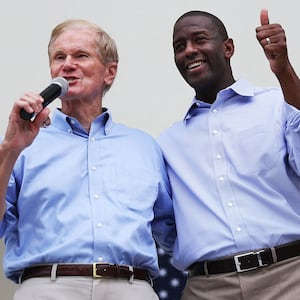TALLAHASSEE, Florida—Thousands of African-American college students. A marching band. Quavo. DJ Khaled. Diddy. They all joined Andrew Gillum at Florida A&M University’s Lawson Center as the clock struck midnight for the Tallahassee mayor’s final rally of the 2018 campaign.
There was a party-like atmosphere that underscored the enthusiasm Gillum has generated throughout his campaign to be Florida’s next governor. But on the eve of the midterm elections, the biggest question for Gillum is whether he can harness that energy among these first-time voters to expand the electorate and propel himself to victory over Republican Ron DeSantis.
The one-time long-shot candidate rocketed to the top of the state’s Democratic ticket after a shock win in the primary fueled, in part, by broad support from African-Americans. And it was no mistake that he held his final rally here at his alma mater, a historically black college.
“Y’all know what it means to party with a purpose? And the purpose is, tomorrow we’ve got to get out and vote like our lives depend on it,” Gillum told the crowd before introducing the evening’s talent. “If you’re willing to do the work, do the difficult task—that quite frankly isn’t so difficult. It’s simply showing up and saying that your life matters.”
As Gillum seeks to mobilize new swaths of the electorate, Republicans are already beginning to sweat about what a Gillum victory would mean for the GOP in 2020 and beyond. For one, Florida is a key swing state in presidential elections. But beyond that, Gillum’s progressive platform and Obama-like charisma could serve as a template for a potential challenger to Trump—one that, in particular, abandons the centrism that has often characterized Democratic campaigns in purple states.
“He’s the avatar of what national Democrats could see as a winning formula in 2020: combining progressive populism with a candidate who could reprise Barack Obama’s diverse coalition,” Liam Donovan, a national Republican strategist, told The Daily Beast. “Some Republicans might welcome this, thinking his platform out of step with what remains a center, center-right country, but they overlook the potency of this combination at their own peril.”
A Democrat hasn’t been elected governor of Florida since 1990. But the idea that Gillum would be the first African-American governor in the state’s history is the driving force among his most ardent supporters, many of whom were apathetic about voting in the midterm elections and were demoralized by the combination of Trump’s victory in 2016 and Obama’s exit from the political arena.
Obama has returned to the campaign trail this cycle, bucking a presidential tradition that avoids the appearance of undermining one’s successor. Obama visited Miami on Friday to campaign with Florida Democrats—and it was Gillum who introduced the former president, underscoring Gillum’s efforts to replicate Obama’s winning formula in a diverse state of more than 13 million registered voters.
President Donald Trump was not mentioned on Monday night, but as is the case with most high-profile contests, the president loomed large. Trump has attacked Gillum as a “thief” without providing any evidence to back up the claim, while lamenting Tallahassee’s “corruption” under Gillum’s leadership, a reference to a federal corruption investigation targeting some city officials. (Gillum has said the FBI told him he is not a target of that probe.) The “thief” jab was viewed by many as racially charged, as was DeSantis’ comment after the primary in which he warned Floridians not to “monkey this up” by voting for Gillum.
But in his pitches to African-Americans, Gillum has kept the focus elsewhere.
In his short stump speech here, Gillum mentioned his opposition to Florida’s so-called “stand your ground” laws, which have been used to legally justify fatal shootings of unarmed black men. He also discussed his support for Amendment 4, the ballot initiative that would restore voting rights for around 1.5 million convicted felons.
“Gillum is the only one talking about this,” said Jasmine, a Florida A&M student who declined to give her last name. “And to have an African-American in there fighting for us—man, we need that.”
Gillum’s rise to national political fame hasn’t come easy, said Rico Taylor, a longtime resident of the city, who used to organize summertime block parties as part of a gang-prevention program. Gillum often attended those events and others that Taylor hosted.
“The Andrew that we’ve been seeing in town as mayor was humble. He’d speak his mind, he’d tell you how he feels about things,” Taylor told The Daily Beast. “But this burst of energy toward positivity, bringing it home, certain policies that he’s running on—to me, he’s just got that fire in the belly right now compared to the Andrew that we have known and seen. And he’s just very energetic and fired up. It’s working.”
A new poll from NBC News and Marist College released Monday gave Gillum a four-point lead over DeSantis. But the DeSantis’ campaign remains upbeat, in part because they’re confident of the president’s broad coalition in the Sunshine State.
Florida Republican leaders have doubled down on their support for Trump in the home stretch, welcoming the president to the state twice in the final week of the campaign in an effort to boost GOP turnout in conservative pockets of the state. Florida went for Trump over Hillary Clinton in 2016—albeit narrowly—and the president has a strong base of support throughout the state, especially in southwest Florida and the panhandle. DeSantis himself is a Trump loyalist, and he has unapologetically campaigned on the Trump agenda.
“Well, I think we’ll see,” DeSantis told The Daily Beast after a rally in Boca Raton when asked what effect the president’s visits will have. “We’re just doing a better job. We’re bringing a lot of people to the forefront. This is a unique midterm election. The story is going to be how successfully we were able to motivate a lot of people to the polls... We’re going to have way more voters than came out in 2014 on the Republican side.”







